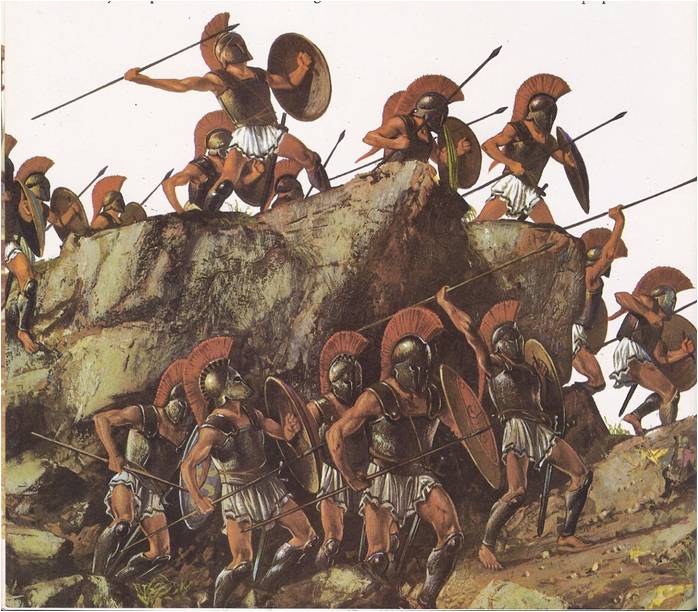If you had been a citizen of the ancient Greek city of Athens on a fine spring morning in 409 B.C., you would have gathered with thousands of your fellow citizens on a hillside inside the city. You would then have listened carefully to the discussion of various matters of business, conducted by the chairman and secretary of the meeting from a platform below and facing you. You would have seen an Athenian citizen thread his way from the hillside to this platform. This was a sure sign that he had a proposal to make to the voters. The citizen turned toward the assembled throng and spoke in a strong, clear voice. A man named Thrasybulus, he said, should be rewarded with a golden crown for his services to Athens. When the speaker paused, another citizen came to the platform. Yes, by all means thank Thrasybulus and give him a golden crown, urged the second speaker. He went on, these acts were not enough, because Thrasybulus was a foreigner, the best reward for serving Athens so faithfully and so well would be to make him an Athenian citizen. Would the voters of Athens do this? he asked. The chairman called for a vote by a show of hands and tellers counted the votes. A majority was in favour of the proposal and it was declared officially to have been approved by the voters of Athens. The secretary had a copy of the proposal carved on a marble slab to make the record permanent and there the record is to this day, over 2800 years later, but still readable! This old record tells us that Athenian citizens held meetings, discussed their own problems, and decided for themselves What they would do. The voters, instead of a pharaoh or a king, made …
Read More »The Greek Way of Life 700 B. C. – 343 B. C.
In the first years of Spartan peace, Greece was filled with wandering soldiers. Their little cities needed them no more. The new governments, which Spartans appointed, looked on them as men who might make trouble and were quick to get rid of them. Homeless and with no way to earn a living, the old campaigners roamed from place to place. They became soldiers of fortune, men who fought for any general or city that offered pay and three meals a day. In 401 B. C., ten thousand of them hired themselves out to Cyrus, a prince of Persia, who hoped to steal his brother’s throne. The Army of Ten Thousand was an odd lot. There were officers and men from a dozen or more Greek states, soldiers who had fought with and against each other during the thirty years of war that had torn Greece apart. Yet, under a foreign commander, they worked well together. They made a strong force which no Asian army could begin to match. Cyrus led them far into Persia and wherever they went they were victorious. Then Cyrus was killed in battle and the Greek officers were tricked and treacherously murdered. The great army suddenly found itself stranded, with neither money nor leaders. The men were not even sure where they were, except that it was hundreds of miles from the coast of Greece. Election of Xenophon The Persian king waited for them to lose heart and surrender, as any Asian army did when it had no officers to give it orders. The Army of Ten Thousand was Greek. After a day of confusion, the soldiers called an Assembly and elected a new general, Xenophon, a young Athenian who had been the assistant of one of the dead officers. For four months he led them …
Read More »Greek Against Greek 430 B. C. – 404 B. C.
About 425 B. C., a lonely man, in a country that was not his own, sat down to write the story of a war that had begun six years before. Thucydides, an Athenian, had fought in the war’s first battles. He had been a general, in command of thousands of his city’s troops. Then he was ordered to go to the aid of another commander whose men were outnumbered. When he arrived, the battle had already been fought and lost. It was not his fault but the people of Athens were too anxious about the war to consider that. They stripped Thucydides of his command and forced him to leave his homeland. Now, while the war raged on, he could only watch and he was troubled by the things he saw. Athens and its rival Sparta were caught in a deadly struggle to see which would be the master of the Greek world. Men died, cities were destroyed and nothing was gained, but the war went on. Thucydides began to write about the senseless fighting, hoping that he might teach the men of another time to avoid war. He wrote about the ambassadors from the city of Corinth, who spoke to the Spartans in their assembly, warning them about Athens. “You have no idea what kind of people these Athenians are”, the Corinthians said, “how altogether different from you. They are always thinking up new schemes and they are quick to make plans and to do something about them; but you are happy with what you have and slow to do even what is necessary. The Athenians are bold and adventurous; you Spartans are cautious and afraid to trust your own strength. They love foreign adventure, which you hate, because they think there is something to win, while you think …
Read More »


